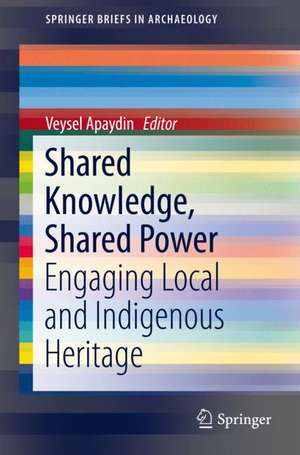Shared Knowledge, Shared Power: Engaging Local and Indigenous Heritage: SpringerBriefs in Archaeology
Editat de Veysel Apaydinen Limba Engleză Paperback – 28 noi 2017
The last several decades have witnessed a rapid increase in the field of cultural heritage studies worldwide. This increase in the number of studies and in interest by the public as well as academics has effected substantial change in the understanding of heritage and approaches to heritage studies. This change has also impacted the perception of communities, how to study and protect the physical residues of heritage, and how to share the knowledge of heritage. It has brought the issue of who has knowledge and how the value of heritage can be shared more effectively with communities who then ascribe meaning and value to heritage materials.
Heritage studies, until a few decades ago, exclusively studied the material culture of the past as part of elitist approaches that completely neglected communities’rights to knowledge of their own heritage. Additionally, heritage practitioners and archaeologists neither shared this knowledge nor engaged with communities about their heritage. Communities were also mostly deprived from contributing to heritage and archaeological studies. This kind of top-down approach was quite common in many parts of the world. But recent studies and research in the field have shown the importance of including the public in projects, and that sharing the knowledge produced through heritage studies and archaeological works is significant for the protection and preservation of heritage materials; it has finally been understood that excluding the public from heritage is not ethical.
This publication presents a wide array of case studies with different approaches and methods from many parts of the world to answer these questions.
Din seria SpringerBriefs in Archaeology
-
 Preț: 447.84 lei
Preț: 447.84 lei -
 Preț: 382.95 lei
Preț: 382.95 lei -
 Preț: 381.00 lei
Preț: 381.00 lei -
 Preț: 386.22 lei
Preț: 386.22 lei -
 Preț: 379.68 lei
Preț: 379.68 lei -
 Preț: 381.00 lei
Preț: 381.00 lei -
 Preț: 378.71 lei
Preț: 378.71 lei -
 Preț: 381.81 lei
Preț: 381.81 lei - 15%
 Preț: 470.24 lei
Preț: 470.24 lei -
 Preț: 411.32 lei
Preț: 411.32 lei -
 Preț: 381.21 lei
Preț: 381.21 lei -
 Preț: 382.95 lei
Preț: 382.95 lei -
 Preț: 448.38 lei
Preț: 448.38 lei -
 Preț: 377.35 lei
Preț: 377.35 lei -
 Preț: 448.28 lei
Preț: 448.28 lei -
 Preț: 380.84 lei
Preț: 380.84 lei -
 Preț: 377.18 lei
Preț: 377.18 lei -
 Preț: 379.86 lei
Preț: 379.86 lei -
 Preț: 445.33 lei
Preț: 445.33 lei -
 Preț: 406.79 lei
Preț: 406.79 lei -
 Preț: 412.13 lei
Preț: 412.13 lei -
 Preț: 420.68 lei
Preț: 420.68 lei -
 Preț: 457.35 lei
Preț: 457.35 lei - 20%
 Preț: 386.76 lei
Preț: 386.76 lei -
 Preț: 316.95 lei
Preț: 316.95 lei -
 Preț: 281.65 lei
Preț: 281.65 lei -
 Preț: 349.47 lei
Preț: 349.47 lei -
 Preț: 377.18 lei
Preț: 377.18 lei -
 Preț: 381.98 lei
Preț: 381.98 lei -
 Preț: 487.37 lei
Preț: 487.37 lei -
 Preț: 381.00 lei
Preț: 381.00 lei -
 Preț: 381.00 lei
Preț: 381.00 lei
Preț: 413.45 lei
Nou
Puncte Express: 620
Preț estimativ în valută:
79.11€ • 82.61$ • 65.33£
79.11€ • 82.61$ • 65.33£
Carte tipărită la comandă
Livrare economică 15-29 aprilie
Preluare comenzi: 021 569.72.76
Specificații
ISBN-13: 9783319686516
ISBN-10: 3319686518
Pagini: 143
Ilustrații: IX, 148 p. 49 illus., 43 illus. in color.
Dimensiuni: 155 x 235 x 11 mm
Greutate: 0.23 kg
Ediția:1st ed. 2018
Editura: Springer International Publishing
Colecția Springer
Seria SpringerBriefs in Archaeology
Locul publicării:Cham, Switzerland
ISBN-10: 3319686518
Pagini: 143
Ilustrații: IX, 148 p. 49 illus., 43 illus. in color.
Dimensiuni: 155 x 235 x 11 mm
Greutate: 0.23 kg
Ediția:1st ed. 2018
Editura: Springer International Publishing
Colecția Springer
Seria SpringerBriefs in Archaeology
Locul publicării:Cham, Switzerland
Cuprins
1. Introduction: approaches to heritage and communities.- 2. Intellectual Soup: On the Reformulation and Repatriation of Indigenous Knowledge.- 3. Who knows what? Inclusivity versus exclusivity in the Interactions of Heritage and Local Communities.- 4. Community Archaeology in Ireland: Less mitigator, more mediator?.- 5. Shaping community heritage synergies between Roman Barcelona spaces and the Gothic neighborhood.- 6.The Herculaneum Centre: the reciprocal benefits gained from building capacities for cultural heritage among institutions and communities. 7. Get'em while they're young: Advances in participatory heritage education in Croatia. 8. The SITAR Project: webplatform for archaeological sharing knowledge. 9. TrowelBlazers: Accidentally crowd-sourcing an archive of women in archaeology. 10. Epilogue: Some reflections on community archaeology and heritage.
Notă biografică
Veysel Apaydin completed his Ph.D. in Cultural Heritage at the Institute of Archaeology, University College London. His doctoral thesis (2015) evaluated political use of the past, identity construction and the relationship between heritage, education and attitudes towards heritage, taking modern-day Turkey as its case study. He worked as an archaeologist and heritage consultant in the United Kingdom and Turkey, and has taught social research methods, heritage and museum studies and public archaeology courses at the Institute of Archaeology, University College London. He is also currently editor of the heritage section of the Journal of Open Archaeology.
Caracteristici
Discusses how heritage is formed, shaped, or constructed by communities by their current requirements, and that community groups are described by their heritage as it represents their identity. Explores how heritage awareness can be increased among the public and local communities as well as defining the best ways of sharing knowledge, power and engaging communities International and practical case studies applying many different approaches and methods
